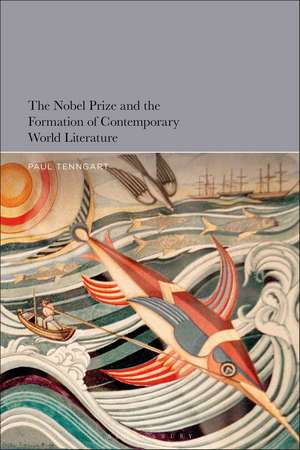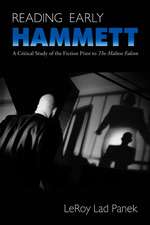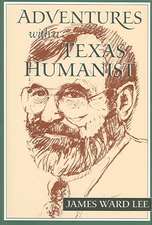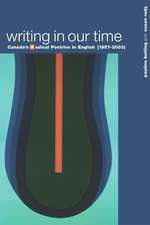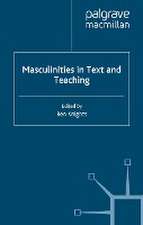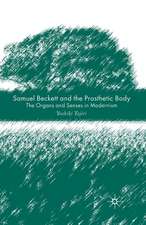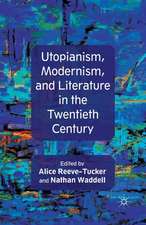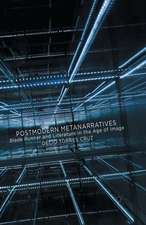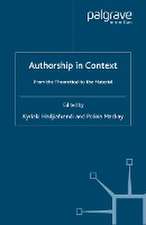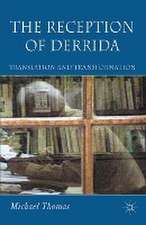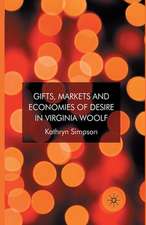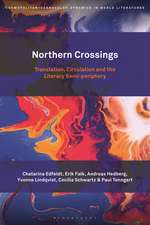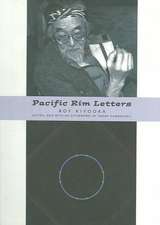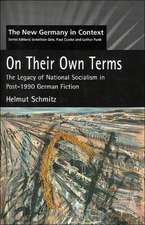The Nobel Prize and the Formation of Contemporary World Literature
Autor Paul Tenngarten Limba Engleză Hardback – noi 2023
Preț: 539.84 lei
Preț vechi: 773.68 lei
-30% Nou
Puncte Express: 810
Preț estimativ în valută:
103.30€ • 108.12$ • 85.98£
103.30€ • 108.12$ • 85.98£
Carte tipărită la comandă
Livrare economică 31 martie-14 aprilie
Preluare comenzi: 021 569.72.76
Specificații
ISBN-13: 9781501382123
ISBN-10: 1501382128
Pagini: 264
Dimensiuni: 152 x 229 x 22 mm
Greutate: 0.51 kg
Editura: Bloomsbury Publishing
Colecția Bloomsbury Academic
Locul publicării:New York, United States
ISBN-10: 1501382128
Pagini: 264
Dimensiuni: 152 x 229 x 22 mm
Greutate: 0.51 kg
Editura: Bloomsbury Publishing
Colecția Bloomsbury Academic
Locul publicării:New York, United States
Caracteristici
Offers insights into the historical, social and cultural contexts of one of the world's most important literary prizes, including archival material from the Nobel Foundation
Notă biografică
Paul Tenngart is Associate Professor in Comparative and Swedish Literature at Lund University, Sweden. He is co-editor of AnthropoScenes: A Climate Fiction Competition (2020) and co-author of Northern Crossings: Translation, Circulation and the Literary Semi-periphery (Bloomsbury, 2022).
Cuprins
1. The Stockholm ConsecrationRelative ContemporaneityCulture, Capital, Crown - and ScienceCosmopolitan Dreams Canon Formation from the Side 2. Entering the Cosmopolitan Scene: The Rise of the Prize Early Breakthroughs and Setbacks (1901-1913) Position Re-Established (1914-1929) A Broader Significance (1930-1939) World Consecration (1944-1953) Breaking News (The 1950s and Onwards)Concluding Remarks 3. Encompassing Everything: The Scope of the Prize World Ambitions The European Template Between Universalism and Pluralism The Problem of AccessThe NominationsThe Actual Distribution of AwardsConcluding Remarks 4. Making History: The Impact of the Prize Impactful Awards The Unawarded The Already Canonized An Alternative Literary History Nobel Effects and the World Literary SystemShaping the Cosmopolitan SpacePolitical ConsequencesConcluding Remarks 5. Defining Literature: The Poetics of the Prize Prize Motivations The Role of the Author and the Purpose of Literature The Poetics of Genre Poetics and Politics Nobel LecturesConcluding Remarks 6. Looking Ahead: The Survival of the Prize Crises Endured The Balancing Act Literary Canonization in an Age of Polarization AcknowledgmentAppendix: Nobel Laureates in Literature 1901-2022ReferencesIndex
Recenzii
How did the annual announcement of the Nobel Prize in Literature become the main event in world literature? Combining detailed historical knowledge with a unique helicopter view, Paul Tenngart's authoritative account is the first to fully map the Prize's astounding literary and cultural footprint. Expertly attuned to the Prize's Swedish and global contexts, this book is essential reading for all scholars of contemporary literature.
Myths about the Nobel Prize for literature have flourished for years, but solid knowledge has been in short supply. With his tremendously well-researched book, Paul Tenngart sets the record straight by examining the history - and future - of the prize from six different angles. Combining a privileged vantage point in Sweden with updated theoretical approaches to world literature and translation, Tenngart generously accounts for the ups and downs of the prize, and demonstrates how its relation to the 'world republic of letters' is more idiosyncratic than often assumed. Written with clarity and verve, The Nobel Prize and the Formation of Contemporary World Literature promises to be a standard reference for years to come.
The award of the prestigious literary Nobel Prize by the Swedish Academy is a crucial marker of contemporary developments in the assessment of literary production across the globe. In this highly informative yet also highly accessible book, Paul Tenngart convincingly chronicles how the Nobel Prize in Literature has shaped and continues to shape the world literature canon. Tenngart expertly details the different contexts in which the Nobel Prize Committee of the Swedish Academy operates and does not shy away from addressing recent controversies surrounding its workings. A must-read for anyone interested in world literature studies.
Myths about the Nobel Prize for literature have flourished for years, but solid knowledge has been in short supply. With his tremendously well-researched book, Paul Tenngart sets the record straight by examining the history - and future - of the prize from six different angles. Combining a privileged vantage point in Sweden with updated theoretical approaches to world literature and translation, Tenngart generously accounts for the ups and downs of the prize, and demonstrates how its relation to the 'world republic of letters' is more idiosyncratic than often assumed. Written with clarity and verve, The Nobel Prize and the Formation of Contemporary World Literature promises to be a standard reference for years to come.
The award of the prestigious literary Nobel Prize by the Swedish Academy is a crucial marker of contemporary developments in the assessment of literary production across the globe. In this highly informative yet also highly accessible book, Paul Tenngart convincingly chronicles how the Nobel Prize in Literature has shaped and continues to shape the world literature canon. Tenngart expertly details the different contexts in which the Nobel Prize Committee of the Swedish Academy operates and does not shy away from addressing recent controversies surrounding its workings. A must-read for anyone interested in world literature studies.
